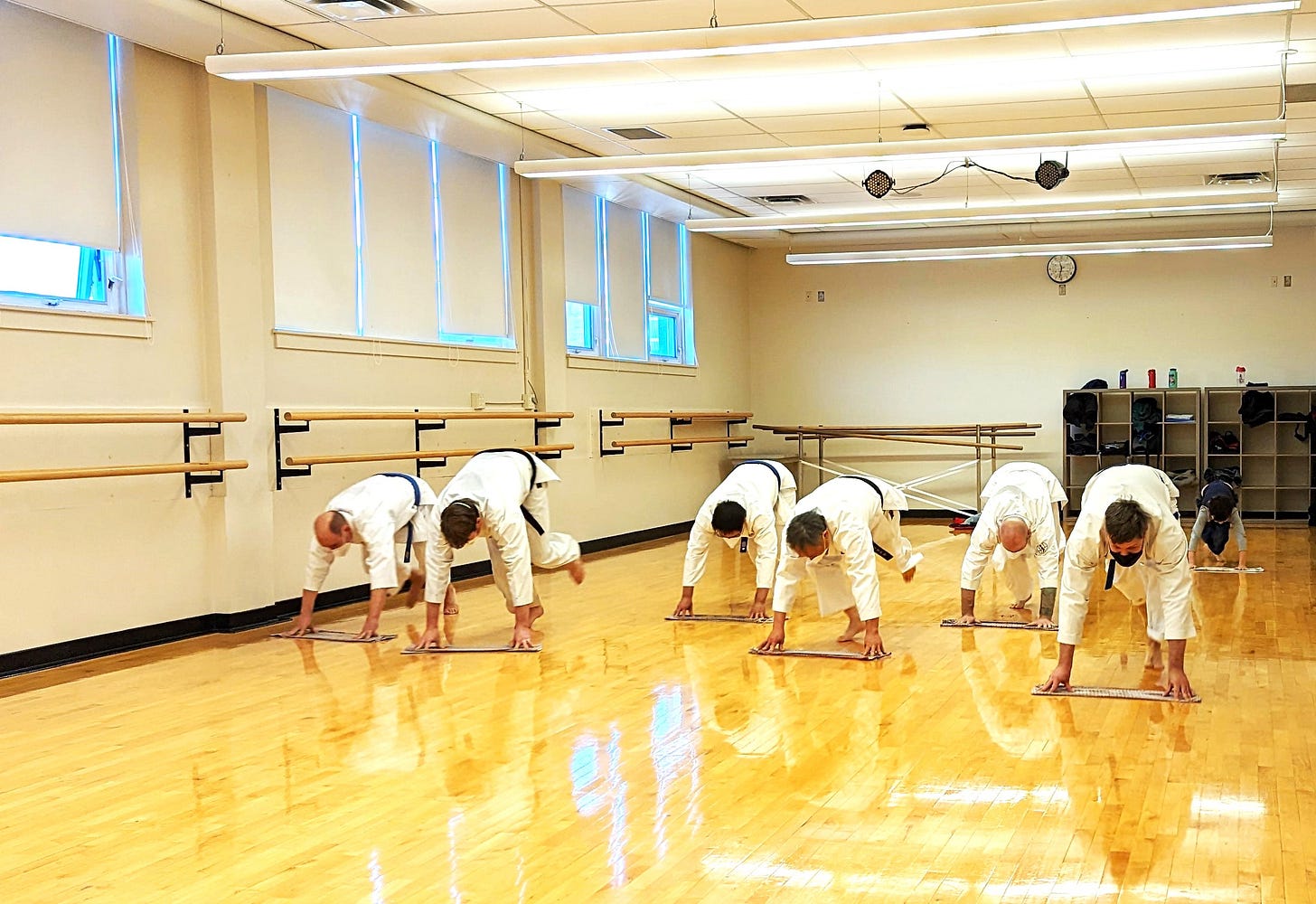The moment you walk into a really good, old-fashioned boxing gym, you catch the ripe smell of honest sweat, a thankfully diluted version of the fragrance of the inside of a hockey equipment bag. Entering a good karate dojo is very different. The Japanese place a high value on seiketsukan 清浄度, the spirit of cleanliness, which means that in a dojo, there must be no residue of the perspiration shed profusely there before.
At the end of each of our karate classes, everyone, whether white belt or black belt, young or old, student or instructor, lines up with their hands pressing a damp towel against the hardwood floor, then runs the length of the dojo, back and forth, until entire floor has been wiped down. This is sōji 掃除 “cleaning.”
A dojo—which is both the training hall and the community that trains there—becomes special only through the respect that its members manifest by what they do. We hold that it is a place to study and humble the self, so how could we expect anyone else to clean up after us? It is our shared place. It is our shared responsibility. As sincere practitioners, we commit to the dojo and our practice.
Karate-dō, which means, “the way of karate,” at its best aims at making its practitioners less centered on the self and more conscious of the world and their obligations to it. My dojo is fortunate to train in a beautiful studio in a local high school where dance classes are held during the day. Before each of our karate sessions, whoever arrives early dust-mops the floor, cleans the mirrors, and gets down on their hands and knees to remove scuff marks, as preparation for training. After class is over, we do sōji. Our obligation is to leave the space better than we found it, so it is clean and ready for its next users. Our aspiration is to make the world a little better because we were there.
Like everything in karate-dō, the key is repetition: doing sōji every time we train instills a habit, in exactly the same way practicing a technique over and over makes it part of our natures, so we can react instantly, without having to think about what to do. For us, sōji is much akin to mokusō, the silent meditation that we do to open and close a class, even though mokusō is staying still and sōji is running with determination. Cleaning the dojo is an embodied way to cleanse the heart and soul, just as sitting in mokusō is an embodied way to empty the self. Sōji is particularly important in this culture, where cleaning workers like janitors or chambermaids are often denigrated as low-class labour. But when it comes to sōji, the dojo is utterly egalitarian: it doesn’t matter if you’re a doctor, lawyer, or executive; it doesn’t matter how much money or education you have; it doesn’t matter if you’re fat or thin, slow or fast, strong or weak. Everyone gets down on the floor and cleans.
The late C W Nicol said of his karate training in Japan,
After each class the students closest to the door would rush out to get buckets of water and cloths. As many as could grabbed a cloth, dampened it in the water and placed it on the floor. Both hands were placed on the cloth, and with his buttocks high and his body almost in a ‘push-up’ position, the washer ran the width of the dojo, cleaning a foot-wide swath. We raced each other across the dojo in this way, thus strengthening hips, legs and arms, and sometimes crashing into each other, laughing and panting
This task was never omitted, and nobody was ever ordered or asked to do it. A few, especially Westerners, dodged it, but the teachers and sempai [seniors] always knew, and although they said nothing, the result of their observations would come out in the quality of individual instruction. Slackers, dodgers, and those with poor spirit were ignored on the dojo floor.
I am less subtle in our dojo. I expect everyone who isn’t injured to do sōji and say so directly. But some of the most fun I’ve had in karate has been running across the floor with my students, straining and panting to not lag too far behind those young legs. There are few things better for cleansing me of pride than having the youngsters outrun me. Of course, that makes me proud, too, but I allow myself that. Strong students in a clean dojo is exactly what we aspire to.






